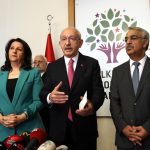The US State Department said in its 2022 human rights report on Turkey that the Turkish government “continued to restrict the enjoyment of human rights and fundamental freedoms and compromised the rule of law” under broad anti-terror legislation passed in 2018.
According to the report, a wide range of human rights issues included:
– Arbitrary killings, suspicious deaths of persons in custody, forced disappearances, torture, arbitrary arrest and continued detention of tens of thousands of persons, including opposition politicians and former members of parliament, lawyers, journalists, human rights activists, and an employee of the US Mission, for purported ties to “terrorist” groups or over peaceful legitimate speech
– Political prisoners, including elected officials
– Transnational reprisal against individuals located outside the country, including kidnappings and transfers of alleged members of the Gulen movement without adequate fair trial guarantees or other legal protections, significant problems with judicial independence
– Severe restrictions on freedom of expression and press freedom, including violence and threats of violence against journalists, closure of media outlets, and arrests or criminal prosecution of journalists and others for criticizing government policies or officials, censorship, site blocking, and criminal libel laws, serious restrictions on internet freedom
– Severe restriction of freedoms of peaceful assembly and association
– Lack of investigation and accountability for gender-based violence, crimes involving violence targeting members of national/racial/ethnic minority groups, and crimes involving violence against lesbian, gay, bisexual, transgender, queer, and intersex persons
“The government took limited steps to investigate, prosecute, and punish officials and members of the security forces accused of human rights abuses or engaged in corruption, and impunity remained a problem,” the report added.
Case of Demirtas and situation surrounding HDP highlighted
Under the section on political prisoners, the report highlighted the case of Selahatin Demirtas, the incarcerated former co-chair of the pro-Kurdish Peoples’Democratic Party (HDP), saying:
“Demirtas has been in prison since 2016 based on terrorism charges despite 2018 and 2020 ECHR [European Court of Human Rights] rulings for his release. In March 2021, in a separate case, a court sentenced Demirtas to three-and-a-half years in prison for insulting President Erdogan during a 2015 speech. Although the Constitutional Court ruled that Demirtas’s lengthy pretrial detention violated his rights in 2020, his release was denied based on the separate Kobane investigation.”
Under the section on elections and political participation, it said:
“The period between the April 2018 announcement of early elections and the vote saw several attacks on political party offices, rallies, and members, including some incidents that led to death and serious injury. Violence mostly targeted the HDP and its campaigners. Opposition party members faced frequent accusations from the highest levels of government of alleged terrorism-related crimes. Several opposition candidates for parliament continued to face legal charges in connection with such claims, and HDP presidential candidate Demirtas was in prison during the campaign.”
Under the same section the report also highlighted the situation surrounding the elected HDP mayors who were removed by the interior ministry on terror allegations:
“The government also suspended democratically elected mayors in multiple cities and municipalities in the southeast and in their place assigned state ‘trustees’ when the former were accused of (but not necessarily convicted of) affiliation with terrorist groups. The government most commonly directed these tactics against politicians affiliated with the leftist pro-Kurdish HDP and its partner, the Democratic Regions Party. The government suspended 81 percent of HDP mayors elected in the 2019 municipal elections. Since 2016, the government removed 88 percent of elected HDP officials (…) The Council of Europe’s Congress of Local and Regional Authorities March report underlined that the appointment of trustees by the AKP government to replace the elected HDP co-mayors was ‘against the international law.'”
Under the section on denial of fair public trial, it observed:
“President Erdogan stated that Turkey does not recognize ECHR rulings in the Osman Kavala and Selahattin Demirtas cases and described the rulings as ‘null and void.'”
Case of Dr. Fincanci
The report also highlighted under the section on freedom of expression, the case of Dr. Sebnem Korur Fincanci, the chairwoman of the Turkish Medical Association:
“On October 26, authorities detained President of the Turkish Medical Association Dr. Sebnem Korur Fincanci on charges of ‘disseminating terrorist propaganda’ for suggesting authorities should investigate the possible use of chemical weapons against Kurdish militants in Iraq. Procedural anomalies, skewed media coverage, rejections of all defense motions, and speedy trial progress were all indicative of political pressure on police, press, prosecutors, and judges. Despite broad public interest, December hearings lasted three to five hours and were held in small standing-room-only courtrooms, with only lawyers, press, politicians, and diplomats permitted inside. The courthouse itself was fortified with police in riot gear and ‘TOMA’ trucks, armed vehicles with water cannons designed for riot control, a posture some observers reported was intended to intimidate. During the December 23 hearing, Fincanci was closely surrounded by nine jandarma, until her defense complained they could not see or communicate with their client. The team of 10 defense lawyers was informed shortly before the hearing that only three of them would be permitted to represent her at a time, creating a last-minute scramble.”
Observations on “judicial interference”
Under the section on denial of fair public trial, the report said:
“The judiciary faced several problems that limited judicial independence, including intimidation and reassignment of judges and allegations of interference by the executive branch (…) Observers raised concerns that the outcome of some trials appeared predetermined or pointed to judicial interference. Human rights groups and trial monitoring organizations reported that in politically sensitive cases, judges frequently barred journalists and observers from the courtroom, interrupted defendants’ statements, did not allow them to speak, rejected defense requests without explanation, handed down a decision without listening to the defendant’s statement, among other procedural irregularities.”
It added:
“Lower courts at times ignored or significantly delayed implementation of decisions reached by the Constitutional Court. The government rarely implemented ECHR decisions, despite the country’s obligation to do so as party to the ECHR. According to the NGO European Implementation Network, the country has not implemented 57 percent of ECHR decisions from the previous 10 years.”
Source: Gerçek News



